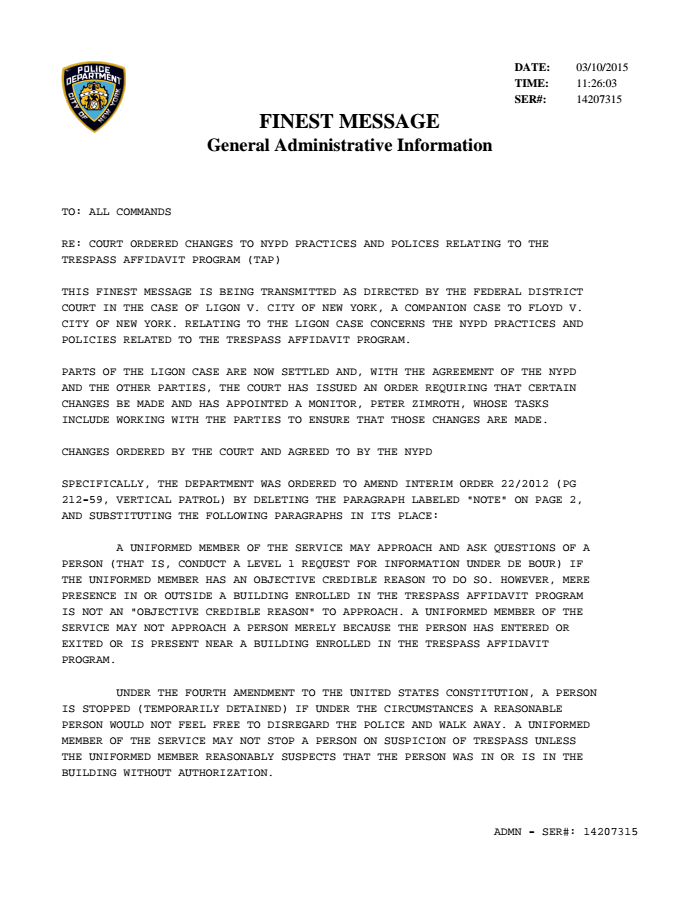
NEW YORK — The New York Police Department has instructed officers not to detain or question people simply for being present in public housing developments and other lower-income residential buildings.
The memo, issued last week, is part of a settlement between the NYPD and the plaintiffs in Ligon vs. City of New York, a 2012 class-action lawsuit in which black and Latino Bronx residents alleged that cops were abusing the provisions of a decades-old policing program to harass people in their own buildings.
"A uniformed member of the service may not approach a person merely because the person has entered or exited or is present near a building enrolled in the trespass affidavit program," the NYPD memo states.
The Trespass Affidavit Program — also known as "Operation Clean Halls" — began in 1991, the year when violent crime peaked in New York. The program identified buildings where criminal activity was allegedly taking place, and asked landlords to grant the NYPD permission to enter the building at any time and arrest anyone who could not prove he or she was a tenant or legitimate visitor.
According to the Ligon complaint, NYPD officers "routinely detain residents of Clean Halls Buildings and their visitors without individualized suspicion of unlawful activity and make arrests or issue summonses without probable cause of criminal activity. For residents of Clean Halls Buildings and their visitors, merely exiting a Clean Halls Building frequently leads to being stopped, searched, and interrogated by NYPD officers on public sidewalks and in exterior courtyards."
Most of the buildings in the Bronx are enrolled in the program, as are some 3,900 buildings in Manhattan, the Atlantic reported.
Backed by the NYCLU, the Bronx Defenders, and other civil rights organizations, the Ligon case was one of several class-action lawsuits brought against the NYPD under then-Commissioner Ray Kelly. The most famous of the lawsuits, Floyd v.s. City of New York, resulted in dramatic changes in the way the NYPD uses the controversial tactic of "stop and frisk."
The Trespass Affidavit Program allows cops to perform "vertical patrols," in which officers climb to the top of public housing towers and then work their way down through the stairwells. It was during one of these patrols that Officer Peter Liang shot and killed Akai Gurley, an unarmed black man, as he headed to his partner's apartment in the Pink Houses, in the East New York section of Brooklyn.
Liang has since been indicted on criminal charges stemming from Gurley's death.
The Patrolmen's Benevolent Association — the largest NYPD union — issued a statement criticizing the new policy.
"The courts have given those with criminal intent the right to loiter in places that they have no legitimate reason to be," PBA President Pat Lynch said in a statement. "The court is protecting the rights of criminals while blatantly violating the rights of residents to have a home free of threats and criminality. The personal rights pendulum has swung way out of control."
The NYPD and the NYCLU did not respond to a request for comment.

